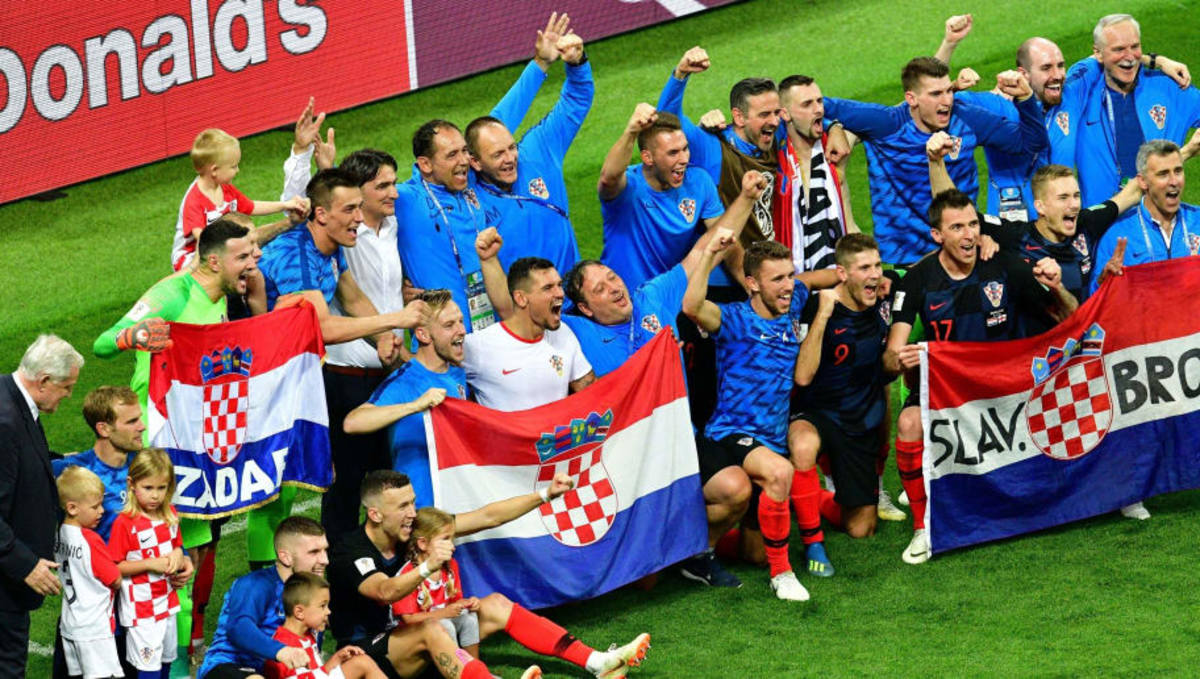Pride and Passion: Croatia's Unrelenting Fighting Spirit Continues to Carry National Hope

I doubt many, if any, would've expected Croatia to make the World Cup final at Russia 2018. Prior to the tournament, an armchair pundit or two may have labelled them the 'dark horse', or a team who could 'surprise a few'. Yet, as a nation smaller in population than Scotland, the Croats are continuing to shock the world.
Rather remarkably, Croatia have multiple stars competing for Europe's elite clubs. Ivan Rakitic just won the domestic double with Barcelona (and is a former treble winner), while Mario Mandzukic is currently at Italian champions Juventus. Ivan Perisic has become a key piece of Internazionale's side, and there's a solid argument for Real Madrid's Luka Modric being the game's best midfielder.
So how have they done it? With a population of only 4.2m people, Croatia shouldn't exactly boast the talent pool of a Germany, Brazil or France. When you look to the development at grass roots level, the only thing that would surprise you is the lack of it. It's all very odd. No infrastructure, no growing domestic league, and no continued coach.
As a matter of fact, current boss Zlatko Dalic managed in Saudi Arabia for the seven years preceding his appointment, so it's not as if the Croatian FA have broken the bank. Add to that Croatia having to defeat Greece in a playoff to even make the World Cup, expectation for this tournament could've been low. However, a national outlook on self-determination and overcoming constant underestimation may be the pivotal piece in this puzzle.
Could we have missed the signs for this seemingly sudden success? Two years ago, the Croats topped a group including Spain at Euro 2016. Things looked rosy for the side, and they found themselves unlucky, narrowly losing to eventual champions Portugal. In a game which Croatia dominated, Ricardo Quaresma scored in the 117th minute of extra-time, breaking hearts from Zagreb to Split.
This time round, Croatia are in no mood to lose games they should win. Crushing a tactically inept Argentina in the opening stage, they won their group comfortably. In what many regarded as the 'easy side' of the draw, Croatia have defeated Denmark, Russia and England. All of which needed extra-time. Unlike the team of last tournament, this side have risen to every challenge thrown at them.
This group have now been heralded the 'second golden generation'. As opposed to the first, they'll be playing in a World Cup final. The 1998 edition of this tournament saw Croatia meet hosts France in the semi final. Unfortunately, they lost 2-1 to a Lilian Thuram inspired side. This squad have the opportunity to avenge their heroes, as they are to take on Les Bleus in Sunday's showdown.
After yesterday's win against England, Ivan Perisic commented about his memories of that time: "We knew what was at stake and how important the semi-final is for a small country like Croatia.
“We started slowly today but we showed our character and again came from a goal behind just like we did in the previous knockout rounds. Twenty years ago I was back at home in my hometown and I rooted for Croatia wearing the Croatia jersey. I could only dream of playing for my country and scoring one of the most important goals to reach the final.”
Many of this current Croatia side will have never known anything but Croatia. However, for those who lived through the troubles of a crumbling Yugoslavia, they may hark back to sport playing a crucial role in uniting their fledgling nation.
In 1992, Croatia won basketball silver at the Barcelona Olympics, losing a final to the greatest side ever assembled in USA's 'dream team'. In spite of the defeat, it was the runners-up who gave the real dream. Less than one year after its successful referendum, Croatia had proven its people right. From the seed of hope, a flower of promise had begun to bloom.
One of the few members of this squad old enough to remember that horrid time is Luka Modric. Displaced from his home town aged six, his grandfather was murdered by Serbian rebels.
A talisman in Croatia's team, he talked about how the power of sport made him who he is today: "You have to understand something about Croatian people. After everything that has happened, after the war, we are stronger, tougher.
"My father fought for me to play football. He never had to make me shinpads but it was a lot of money to send to me to a soccer school. And to provide boots and things. He still works in the military, as an aircraft technician. He always tried to find ways to support me with my football."
Although now is not the time to talk about the differences of society and culture, it is clear Croatian's know who they are. While they might not be the most talented nation from back to front, team spirit and determination is unquestionable. A passion unrelenting, there should be no doubt that they could shock France on Sunday. If Croatia can hold on to the belief shown throughout this tournament, they can make their country prouder than ever.







